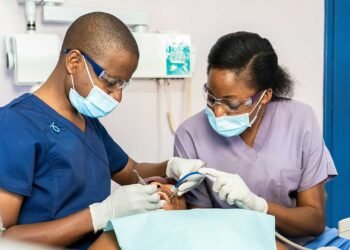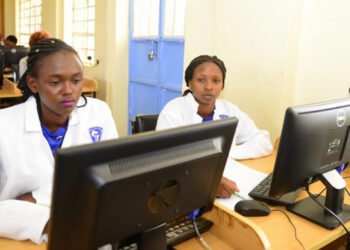Diploma in Medical Laboratory Sciences Programme
Entry requirements
Credits in Biology and Chemistry and one in either Physics or Mathematics at ‘O’ level.
Laboratory Assistant with three years experience who has passed the selection examination recognized by the University and must have ‘O’ level secondary school certificate
Medical Laboratory Technologist and Scientist
Medical laboratory technologists and scientists conduct medical laboratory tests to provide information for diagnosing, treating and preventing disease. They work as part of a team with doctors, pathologists, scientists, technicians and laboratory assistants. They may be required to supervise the work of other technical officers and assistants and advise medical practitioners on the interpretation of tests.
Medical laboratory technologists assist doctors and pathologists in the diagnosis of diseases by performing all kinds of clinical laboratory tests. The three main lines of work are: diagnostic work; research work; and the preparation of serum and vaccines. The medical laboratory technologist does not work directly with patients. He or she forms part of a laboratory team, assisting a “professional officer” who has a degree. Some technologists identify disease-causing organisms, parasites, fungi, viruses and cancer cells, some do research and develop new laboratory techniques, while others teach at tertiary institutions. Medical laboratory technologists train and supervise laboratory aides and other technologists.
Medical laboratory technologists and scientists study blood and its diseases, count blood cells and examine blood slides with a microscope. They identify blood diseases such as anaemia and leukaemia and determine the suitability of blood for transfusion by cross-matching the blood with the patient and checking for the presence of diseases such as hepatitis and AIDS. They test blood for blood group antibodies that may cause disease in newborn babies and check the compatibility of bone marrow, kidney and other organs for transplantation.
Medical laboratory technologists also determine the chemical composition of specimens such as blood and urine, which is important in the diagnosis and treatment of kidney disease, liver disease and diabetes. They grow disease-causing organisms such as bacteria, viruses and fungi that are taken from a variety of clinical specimens. They prepare body tissues (taken from the body during surgery or post-mortem examinations) for microscopic examination by pathologists. They prepare body fluids for microscopic examination and diagnose abnormalities.
They isolate and examine genetic material (DNA and RNA) for alterations specific to genetic diseases and cancer, which assist in the diagnosis and treatment of these conditions.
Some areas of specialization include:
– Blood Banking and Transfusion Science
– Chemical Pathology
– Clinical Biochemistry
– Cytogenetics
– Cytology (Cancer Diagnosis)
– Forensic Pathology
– Haematology (study of blood cells)
– Histopathology
– Immunology
– Microbiology
– Parasitology
– Pharmacology
– Virology
There is a great demand for qualified medical laboratory technologists as a result of the phenomenal development of medical science and this is likely to continue because of constant research and advancements in this field. Medical laboratory technologists often take further education courses, attend seminars or read professional journals to keep up with these changes. Since some research is financed by private and government sources, opportunities in the research field may be influenced by the economic conditions in the country.
Medical laboratory technologists work indoors in laboratories that are usually well-equipped, spacious and well ventilated. Considerable attention is given to sterilization of surroundings and apparatus.
Satisfying Aspects
– being an important part of the medical field
– the opportunity to work part-time
– being independent, working with a minimum of supervision
– being able to specialize in an area of one’s choice
Demanding aspects
– working in an environment which may occasionally have unpleasant odours
– working nights, holidays or weekends in some work settings
Requirements
– good judgement and decision-making ability
– responsible, conscientious and extremely accurate workers
– interest in and aptitude for medical science
– concern for human welfare
– good health
– manual dexterity
– normal colour vision
– able to make clear and precise observations
– able to work accurately with attention to detail
– good verbal and written communication skills
– able to identify and analyse problems and develop practical solutions
– able to perform under pressure
– able to organize and prioritize work
School Subjects
Compulsory Subjects: Mathematics, Physical Sciences, Life Sciences
Recommended Subjects: None
The duration of the course is three years. After obtaining the diploma, the student is then required to apply to a laboratory, which is registered as a training laboratory with the HPCSA (Health Professions Council). This enables the student to complete a fourth year of practical training in medical technology. Once the above is completed the student must pass a final examination to enable him to register and practise as a medical technologist.
Employer
– hospitals
– research organizations
– government health departments
– private clinics
– private pathologists
– universities (medical and veterinary)
– industrial firms
– blood transfusion services
Diploma in Medical Laboratory Sciences Programme colleges in Tanzania
- Catholic University of Health and Allied Sciences (Cuhas)
- City College of Health and Allied Sciences
- Kampala International University in Tanzania (Kiut)
- Kilema College of Health Sciences
- Mbalizi Institute of Health Sciences – Mbeya
- Muslim University of Morogoro
- Rubya Health Training Institute
- Singida College of Health Sciences and Technology
- Biharamulo Health Sciences Training College
- Bishop Nicodemus Hhando College of Health Sciences
- Ruaha Catholic University (Rucu)
- Karagwe Institute of Allied Health Sciences
- Amo Training Centre Tanga
- Excellent College of Health and Allied Sciences – Dar Es Salaam
- Kigamboni City College of Health and Allied Sciences
- Tandabui Institute of Health Sciences and Technology
- Kolandoto College of Health Sciences
- Nyakahanga College of Health and Allied Sciences
- Nkinga Institute of Health Sciences
- Paradigms College of Health Sciences
- Haydom Institute of Health Sciences
- Muhimbili University of Health and Allied Sciences (Mh)
- Janesa Institute of Health and Allied Sciences – Dodoma
- Morogoro Public Health Nursing School
- St John’s University of Tanzania (Sj)
- Mount Ukombozi Health Sciences Training Centre
- Decca College of Health and Allied Sciences – Dodoma
- Dar Es Salaam Police Academy
- Amenye Health Training Institute
- Mvumi Institute of Health Sciences
- The State University of Zanzibar (Sz)
- Bakhita Health Training Institute
- Besha Health Training Institute
- Sengerema Health Training Institute
- Kam College of Health Sciences
- Aggrey College of Health Science
- Lugarawa Health Training Institute (Luheti)
- Kilimanjaro Christian Medical University College (Kcmu)







Discussion about this post